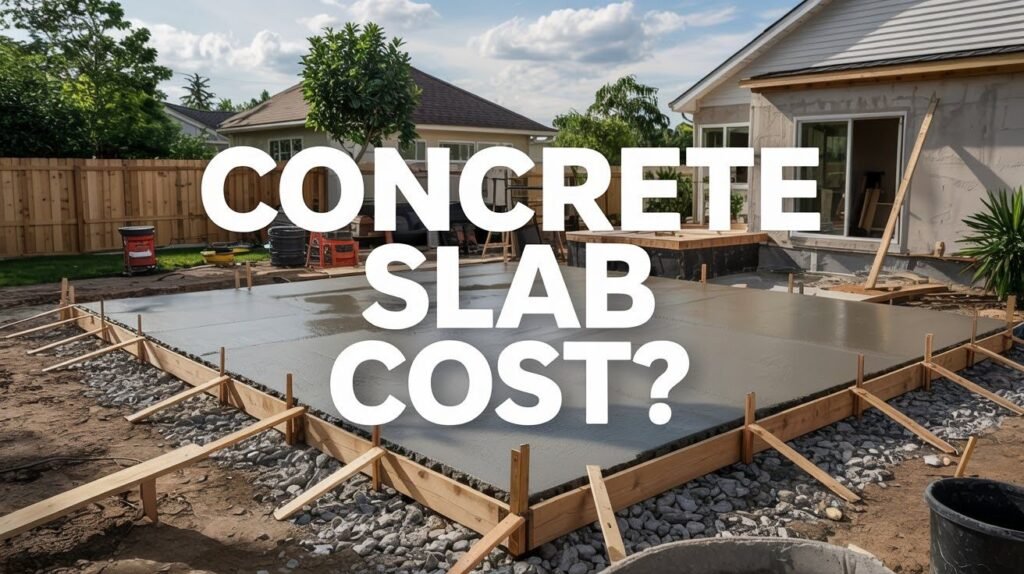Planning a new driveway, patio, or foundation? You’re probably wondering about concrete slab costs.
A concrete slab is a flat, horizontal surface made from poured concrete and reinforced with steel. It’s the foundation for countless construction projects.
Knowing costs upfront saves you from budget surprises. I’ve seen homeowners shocked when quotes come in way higher than expected. Here’s the thing as prices vary more than you think, depending on size, thickness, type, and finish.
Some slabs cost as little as $600. Others run into thousands. Location matters. Labor rates differ. Material quality changes everything. The contractor you choose makes a significant difference, too.
Smart homeowners research before they spend. They compare options. They understand what affects pricing. This guide gives you the real numbers, plus insider tips to keep costs reasonable.
What Is a Concrete Slab?
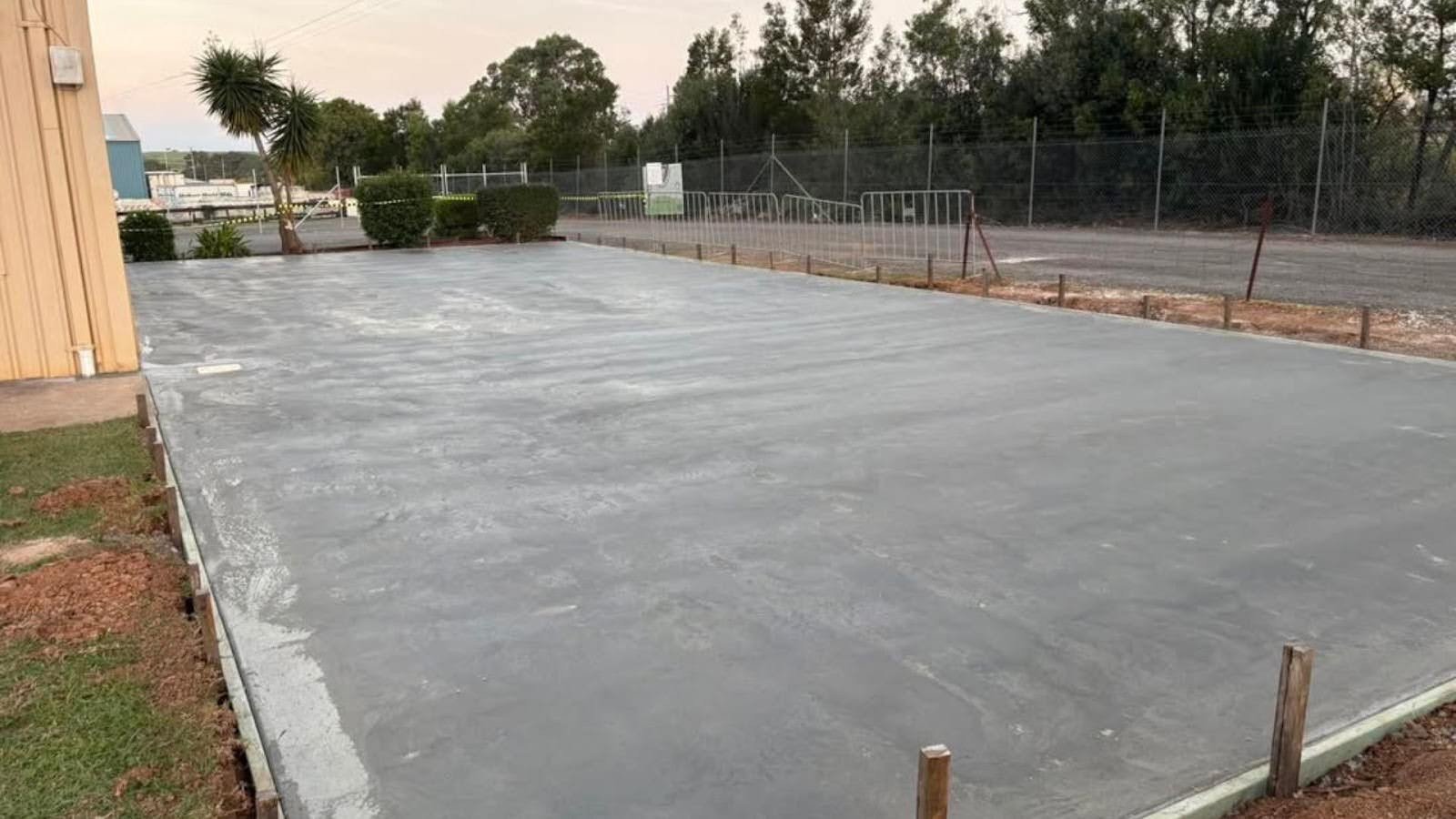
A concrete slab is exactly what it sounds like as a flat surface made of concrete. Think of it as a giant pancake, but much stronger and more permanent.
Common uses include:
- Driveways and parking areas
- Patios and outdoor living spaces
- Foundation bases for sheds and garages
- Basement floors
- Sidewalks and walkways
Most slabs start as liquid concrete poured into forms. Steel reinforcement (rebar or mesh) adds strength. The concrete cures over several days, becoming rock-hard.
It’s durable, affordable, and handles heavy loads. Modern construction relies on concrete slabs because they last for decades with minimal maintenance.
Average Cost of a Concrete Slab
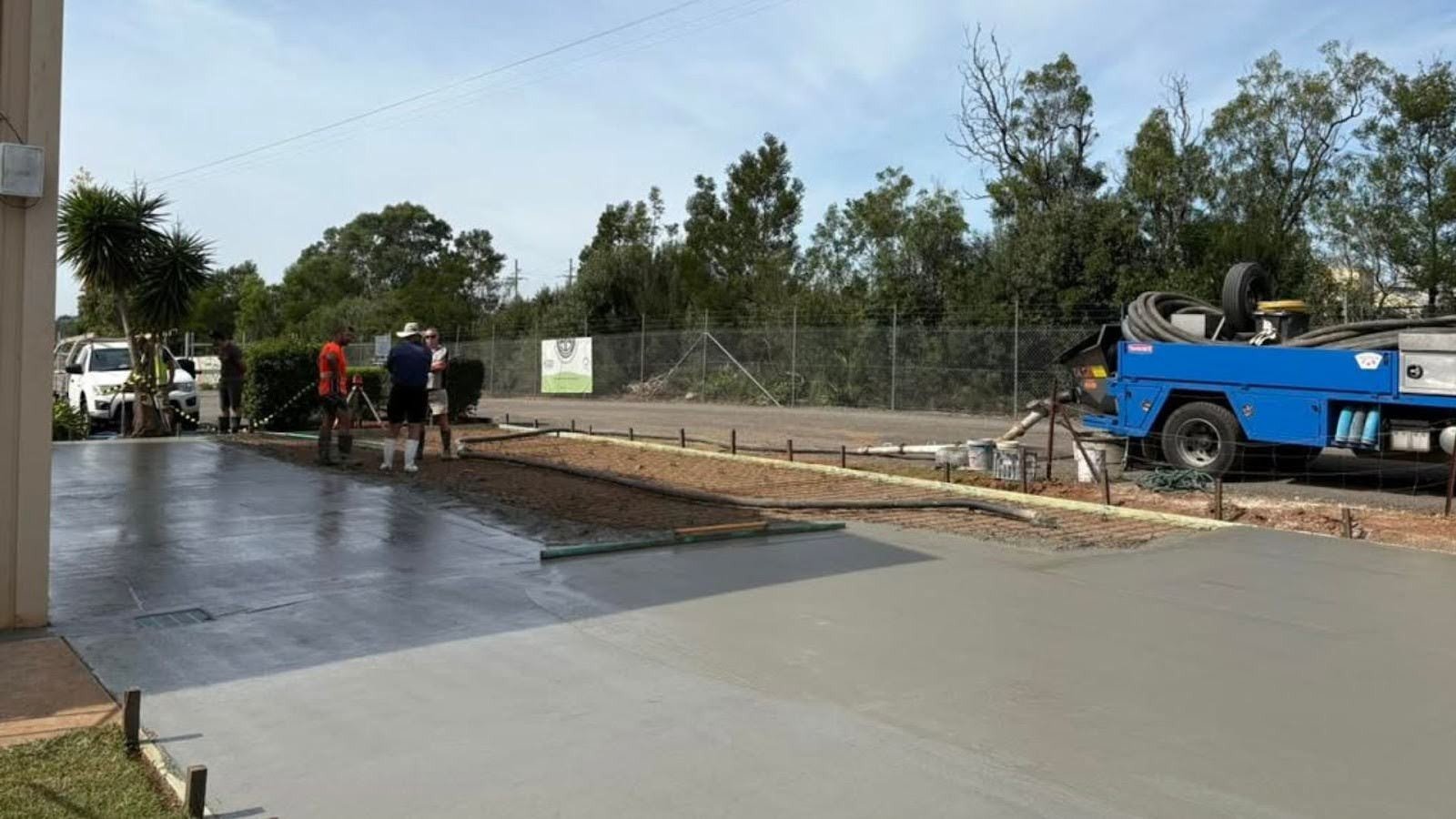
The national average runs $6 to $12 per square foot for basic concrete slabs. That’s just materials and labor for standard thickness.
Here’s what you can expect for different sizes:
Size vs. Approximate Cost
|
Slab Size |
Square Feet |
Cost Range |
|
10×10 |
100 sq ft |
$600 – $1,200 |
|
20×20 |
400 sq ft |
$2,400 – $4,800 |
|
30×40 |
1,200 sq ft |
$7,200 – $14,400 |
Remember, these are ballpark figures. Your actual costs depend on local rates, site conditions, and specific requirements.
Basic slabs cost less. Decorative finishes cost more. Way more sometimes.
Cost Breakdown by Size
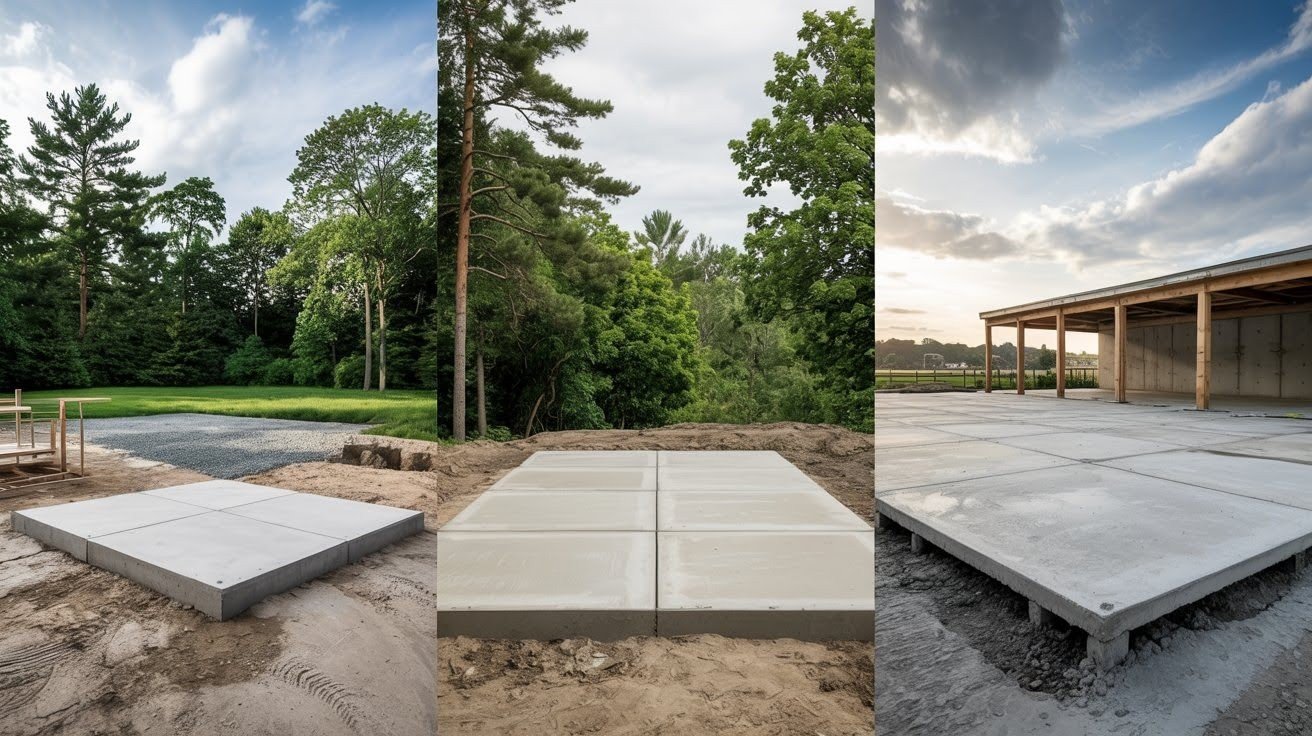
Small Slabs (up to 100 sq ft)
Perfect for walkways, small patios, or shed bases. These compact projects are great for beginners.
Average cost range: $600 – $1,500
Common uses:
- Garden shed foundations
- Small patios
- Walkway sections
- Equipment pads
Pros: Lower total cost, easier permits, manageable DIY project. Cons: Higher per-square-foot cost due to minimum charges
Medium Slabs (100-400 sq ft)
The sweet spot for most homeowners. Garages, decent-sized patios, and workshop floors fall here.
Average cost range: $1,500 – $6,000
Common uses:
- Single-car garage floors
- Medium patios
- Workshop foundations
- Pool decks
Considerations: You’ll likely need permits. Site preparation becomes more important. Thickness requirements may increase for vehicle loads.
Large Slabs (400+ sq ft)
Big projects mean big costs, but potentially better per-square-foot rates.
Average cost range: $6,000 – $20,000+
Common uses:
- House foundations
- Large garage floors
- Barn foundations
- Commercial applications
Note: Contractors sometimes offer bulk discounts on materials. However, complex site prep and longer labor times can offset savings.
Types of Concrete Slabs and Their Costs
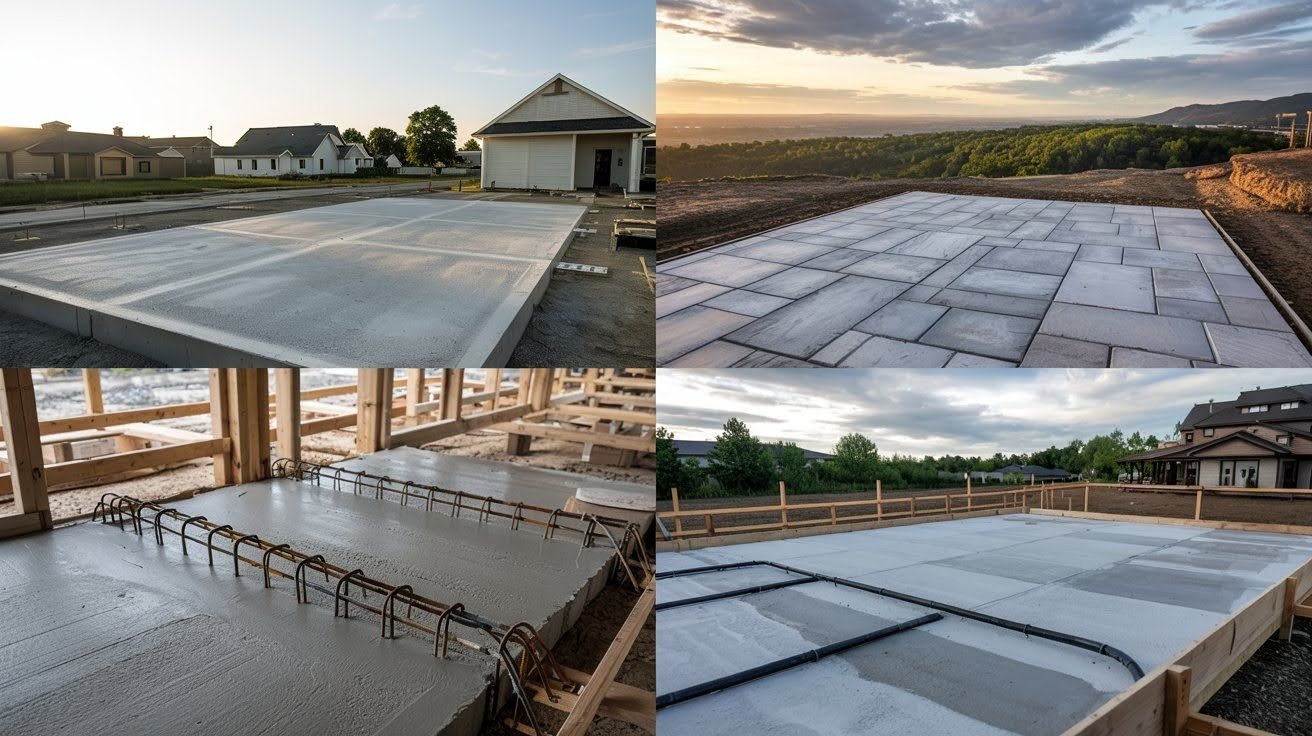
Basic Concrete Slab
The standard option. Smooth, gray surface with minimal finishing.
Cost: $6 – $8 per square foot
Best for: Foundations, utility areas, budget projects
Finish: Broom finish or smooth trowel
Stamped or Decorative Concrete
Patterns and colors that mimic stone, brick, or tile. Popular for patios and driveways.
Cost: $10 – $18 per square foot
Best for: Patios, decorative driveways, pool decks
Options: Stamped patterns, colored concrete, exposed aggregate
The extra cost comes from specialized tools, additional labor, and premium materials.
Reinforced or Structural Slab
Heavy-duty slabs with extra steel reinforcement. Required for load-bearing applications.
Cost: $8 – $12 per square foot
Best for: Foundation slabs, heavy equipment areas, commercial use
Features: Rebar grid, thicker pour, engineered specifications
Heated Concrete Slabs
Embedded heating systems for comfort and snow melting.
Cost: $12 – $20 per square foot
Best for: Driveways in cold climates, heated patios, luxury applications
Benefits: Comfort, energy efficiency, snow removal
Higher upfront costs but long-term energy savings in cold climates.
Factors That Influence Concrete Slab Costs
- Thickness of the slab: Standard is 4 inches. Driveways need 6 inches. Heavy loads require 8+ inches.
- Local labor rates: Urban areas cost more. Rural areas may have limited contractors.
- Type of finish or texture: Smooth costs the least. Stamped patterns cost the most.
- Site preparation: Level sites cost less. Slopes, trees, and poor soil increase costs.
- Permits and inspection fees: Varies by location. Budget $100-$500 for permits.
- Add-ons – Drainage systems, insulation, vapor barriers, and decorative borders all add cost.
Weather affects timing. Winter in cold climates requires special measures and costs more.
DIY vs. Hiring a Pro
DIY Savings: You can save 40-60% on labor costs. A $3,000 professional job might cost $1,200 in materials.
DIY Risks: Concrete doesn’t forgive mistakes. Poor mixing, timing, or finishing ruins the project. You’ll need tools: a concrete mixer, screeds, floats, and finishing tools.
When to hire a pro:
- Slabs over 400 square feet
- Structural or reinforced slabs
- Decorative finishes
- Sloped or challenging sites
- When permits require professional installation
DIY considerations: Concrete delivery, tool rental, and physical demands. Most suppliers deliver, but you need help for larger pours.
Tips to Save on Concrete Slab Costs
- Prices vary significantly between contractors. Aim for at least three estimates.
- Schedule in off-peak seasons because fall and winter often bring lower rates
- Go for basic finishes unless design is a priority.
- Buy materials in bulk and coordinate multiple pours to save on delivery fees.
- Clearing, leveling, and basic grading reduce labor costs.
- Vapor barriers and insulation aren’t always required.
- Avoid peak construction seasons when contractors charge premium rates.
- Split delivery costs and potentially get bulk pricing.
Conclusion
Concrete slab costs depend heavily on size and type. Basic slabs run $6-$8 per square foot. Decorative options cost $10-$18. Large projects often get better rates, but small slabs work fine for simple needs.
Site conditions matter enormously. Level, accessible sites cost less than challenging locations. Local labor rates vary widely across regions. Weather timing affects both the cost and quality of the final product.
The key is preparation and research. Understanding your options helps you make informed decisions. Comparing quotes reveals price differences you might not expect.
Always get site-specific quotes before making decisions. Online calculators provide rough estimates, but actual conditions affect pricing significantly. Smart planning and timing can save you thousands on larger projects while ensuring quality results.
Frequently Asked Questions
How thick should my concrete slab be?
Standard thickness is 4 inches for foot traffic areas like patios. Driveways need 6 inches to handle vehicles. Heavy equipment or structural loads require 8+ inches with reinforcement.
Do I need permits for a concrete slab?
Most areas require permits for slabs over 100-200 square feet or structural applications. Contact your local building department early. Permits typically cost $100-$500 and take 1-2 weeks to process.
How long does concrete take to cure?
You can walk on concrete after 24-48 hours. Light vehicle traffic is safe after 7 days. Full strength develops over 28 days. Weather affects curing time significantly.
Can I pour concrete myself?
Small slabs (under 200 sq ft) are manageable DIY projects. Larger pours require experience, proper tools, and helpers. Mistakes in concrete are expensive to fix.
What’s the difference between concrete and cement?
Cement is an ingredient in concrete. Concrete contains cement, sand, gravel, and water. Think of cement as flour in bread – important, but not the whole product.


